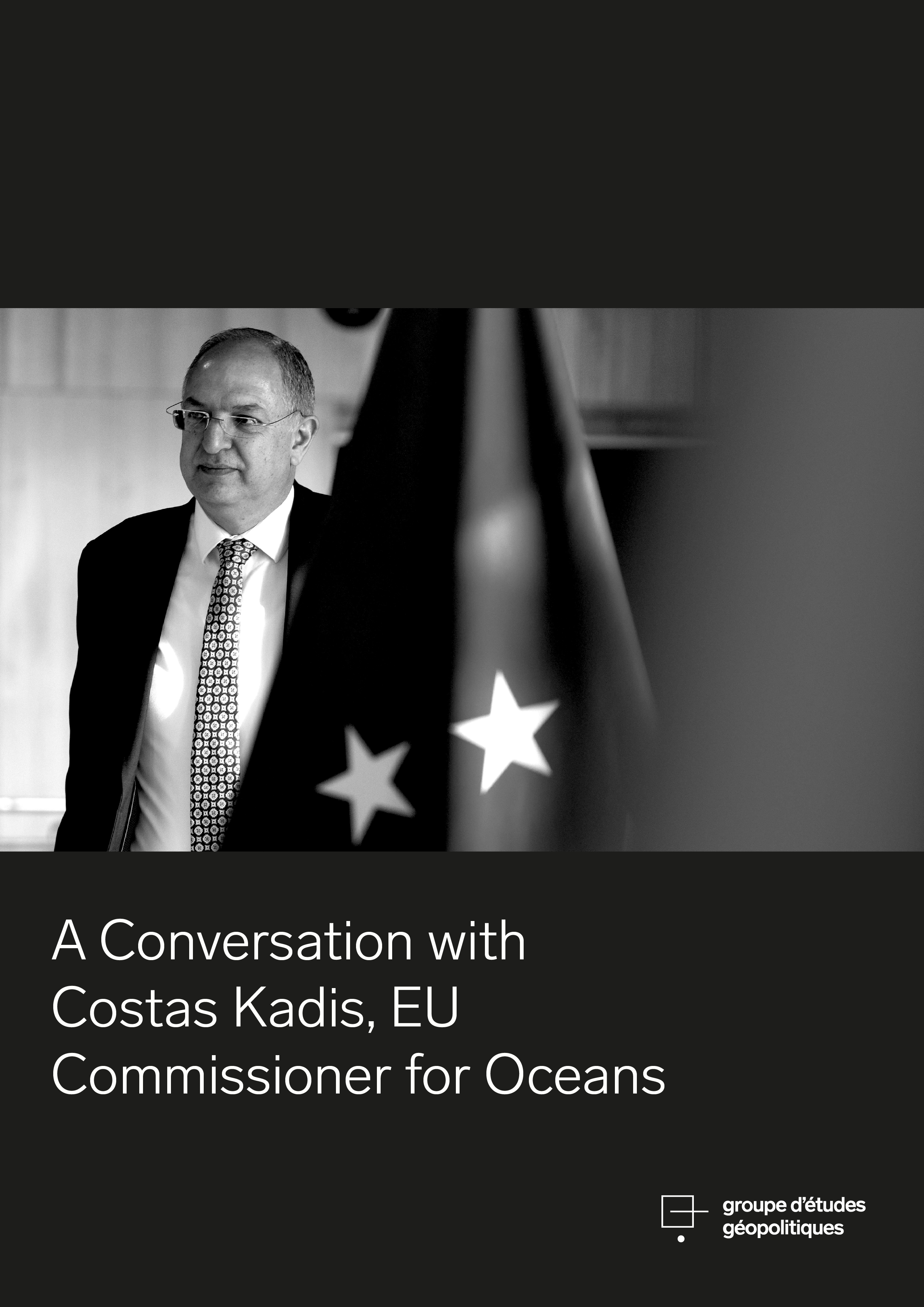A conversation with Costas Kadis, European Commissionner for Fisheries and Oceans
Maria Tadeo
Grand Continent EU Correspondant11/06/2025

A conversation with Costas Kadis, European Commissionner for Fisheries and Oceans

Maria Tadeo
Grand Continent EU Correspondant11/06/2025

 Voir tous les articles
Voir tous les articles
A conversation with Costas Kadis, European Commissionner for Fisheries and Oceans
The Ocean Conference held in Nice this week under the umbrella of the United Nations, France and Costa Rica saw some 50 heads of state gather together to discuss how to protect the oceans, the maritime ecosystem and its biodiversity. The ocean and the high seas are a matter of international collaboration – but also of sovereignty. What is your assessment ?
The ocean is one and it connects us all.
Whatever we do in our exclusive maritime zones, as sovereign states, as the European Union, affects other parts of the planet. We need coherent, common action. No single country or jurisdiction has the ability to protect the oceans alone. Anyone who suggests otherwise misunderstands the nature and complexity of the challenges we face as a global community.
During the conference, the European Union presented the European Ocean Pact, an initiative that aims to coordinate all ocean-related activities and ensure that policies are implemented in a harmonised way. This is the first time that the Union has proposed an integrated governance plan for the oceans. This is our message to the international community: let’s work together. This initiative is our emblem, and it was well received by many of our partners. It is for nations whose ecosystem is at risk and who cannot respond alone because they lack the capacity, financing or technology. They understand that this is a global priority and are interested in our ideas and proposals.
The current global environment is characterised by a breakdown in international rules and constant power struggles. Do you still believe that the kind of collaboration you describe is possible?
It’s not a matter of conviction; it’s about stakeholders — not just politicians — calling on us to do more. There is tremendous momentum on the ground to get results. It’s possible that negotiating will become more difficult, but that doesn’t mean we should give up. The European Union will never walk away from the negotiating table, and our partners value and respect that. In many of the discussions I’ve had this week with our colleagues in Latin America, the Caribbean and the Pacific, the desire to achieve progress is equally strong. Sometimes we focus on areas of disagreement, but we shouldn’t forget that much of the world still believes in multilateralism and progress.
The United States did not send a political representative to the conference, instead dispatching a small technical delegation.
It is disappointing because the United States has a strong voice and plays a significant role in international governance. I would have preferred them to be here. Nevertheless, this also gives us more incentive to play a bigger role as Europeans.
We tend to focus on those who aren’t present, but we should also consider those who are. We have managed to secure the ratification of the High Seas Treaty by 50 countries, which is extremely important in addressing governance gaps in preserving and ensuring the suitability of marine biological diversity beyond national jurisdictions. This will establish a legal framework for international cooperation. We are confident that more countries will join soon. I hope that, on the other side of the Atlantic, this will be seen as a sign that the world wants alliances and is moving forward.
In contrast, the Chinese delegation was highly active during this conference. Do you trust China as a partner?
Anyone who contributes to the sustainable management of our oceans is a potential partner. We need China’s collaboration. It is a major player.
And one of the biggest polluters.
That’s why we need to collaborate on more sustainable management. We will soon be hosting the EU-China summit, at which we will need to discuss these issues. Sustainable fishing is an important part of my portfolio, and of course we want to see a level playing field for our fishing industry. One of our goals is to see real reciprocity from the Chinese side, which is key to our relationship.
French President Emmanuel Macron announced that an additional 15 countries had pledged to ratify the High Seas Treaty, bringing the total number of signatories to 65. He seemed optimistic that the required quorum of 60 countries would be reached to allow the treaty to be implemented. Do you agree?
We have made tremendous progress. We just need ten more ratifications to make it effective. I’m confident that this will happen by next year. However, we must maintain our momentum. To this end, we are launching a High Ambition Coalition to support countries in this process. I am pleased to say that 41 countries have expressed interest and joined the coalition.
The European Union is committed to supporting the full ratification and implementation of the treaty through our Global Ocean Programme. To this end, we will provide 40 million euros in funding to help partner countries preserve and sustain biodiversity in areas beyond national jurisdiction.
As Europeans, do we underestimate how much the world needs Europe? Conversations about the future of Europe have been rather negative this year. Mario Draghi discussed reform — or agony.
Without European efforts, we would not be moving so close to ratifying this important treaty. The Ocean Conference in Nice is proof of that. We managed to unite the world in a collective effort at a difficult time. Our partners see Europe as a force for good. President Lula of Brazil was in attendance, as were delegations from Latin America, Africa, the Pacific and the Caribbean. Now is the time to strengthen our alliances.
Important environmental conferences such as COP have recently lost credibility in emerging and developing economies due to a perceived lack of commitment and binding funding targets. What will be different this time?
This conference has different goals. For example, negotiations are handled differently and we have examined a specific yet hugely important area, such as the high seas, in great detail. The focus is on implementation rather than financing. In that sense, we are more advanced.
It is important to remember that we are doing this because it benefits us as Europeans. The European Union is an Ocean Union, too. We have a combined coastline of 70,000 kilometres and almost 40 per cent of the Union’s population lives within 50 kilometres of the coast. However, our ocean is also under threat from biodiversity loss and the overexploitation of marine resources. If the policies around it are implemented in a coordinated way among Europeans and in alignment with the rest of the world, the ocean offers us immense potential, from economic to health benefits.
Financing will be equally important.
Many of the announcements made in Nice were also accompanied by financial commitments. I disagree that this conference only produced words. However, I’m also realistic: there is a financing gap. Clearly, we will also need private investment and a large mobilisation of private capital. Ratifying the High Seas Treaty is crucial for that. It is a means of implementing the measures we have agreed upon collectively. We can’t expect private capital to move if the rules aren’t clear.
The European Commission is currently reviewing its executive agenda with a view to simplifying regulations. Some argue that the Commission is abandoning the Green Deal, and that its commitment to environmental issues has weakened. Is there not a contradiction between your actions in Brussels and your discourse in Nice this week?
We’re not going back; we’re making adjustments. Our destination remains the same. Our goal is to make Europe the most competitive and cleanest it can be. What is changing is that, in our efforts to reach these targets, we cannot — and must not — forget the importance of competitiveness. This is also about the prosperity of our people.
We are engaged in a significant effort to simplify processes and reduce bureaucracy. Sustainability should be based on three pillars: the economy, society and the environment. We must find the right balance so that these three areas can advance together rather than in opposition.
citer l'article
Maria Tadeo, A conversation with Costas Kadis, European Commissionner for Fisheries and Oceans, Jun 2025,




